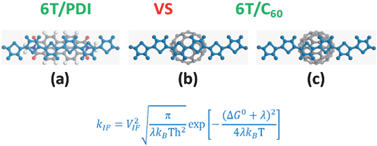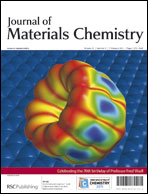A comparative theoretical study of exciton-dissociation and charge-recombination processes in oligothiophene/fullerene and oligothiophene/perylenediimide complexes for organic solar cells†‡
Abstract
The exciton-dissociation and charge-recombination processes in donor–acceptor complexes found in α-sexithienyl/C60 and α-sexithienyl/perylenetetracarboxydiimide (PDI) solar cells are investigated by means of quantum-chemical methods. The electronic couplings and exciton-dissociation and charge-recombination rates have been evaluated for various configurations of the complexes. The results suggest that the decay of the lowest charge-transfer state to the ground state in the PDI-based devices: (i) is faster than that in the

- This article is part of the themed collection: Celebrating the 70th birthday of Professor Fred Wudl

 Please wait while we load your content...
Please wait while we load your content...